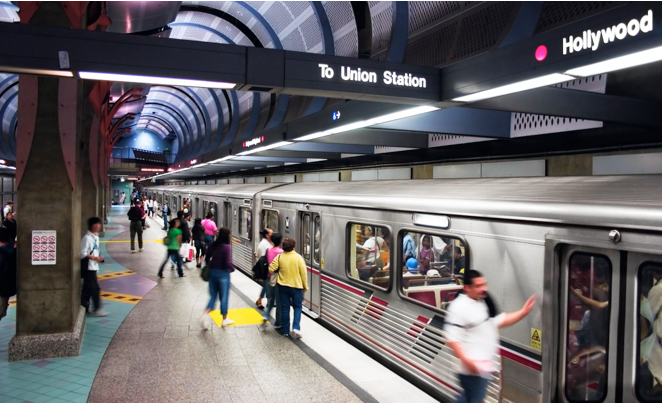CommentsDEEGAN ON LA-Is METRO mocking us? The regional public transportation giant that moves tens of thousands of people across Los Angeles every day, says that the recent voter approval of Prop M, and the billions of annual tax dollars it will bring to them forever (there is no sunset for this special tax) is not enough. They say Prop M is just for construction and not operations. We need more money from some other source to help keep fares down, they plead. Otherwise, it seems, transit riders may be asked to help make up the difference through fare increases.
Coming out of their December board meeting, Metro directors want us to believe they must have what they call a “Property Naming-Corporate Sponsorship Policy” and the sales from it to help pay their operating expenses.
This presents an interesting dichotomy: wealthy corporate interests splashing their names all over transit “products” in a pay-to-play scheme on one end, targeting mostly Latino and Black riders on the other end. Metro’s latest “Biannual Onboard Survey” indicates Latinos make up around half of all bus and train riders, with Blacks making up about one quarter. So, 75% of all riders fit a specific ethnic profile that is attractive for advertisers and corporate sponsors. These leading racial groups, as well as other transit riders, may be asked to pay higher fares if other sources of revenue like corporate sponsorships are not available.
For Metro, a public agency stewarding a public resource, to activate the sponsorship program could trigger a slippery slope leading to the crass commercialization of an otherwise very good public transit system. Leveraging corporate branding by condescending to minority riders, telling them that it will save them a rate hike, is bad policy and bad public relations.
Here are the naming rights Metro says are up for grabs in the categories of Facilities, Transit Services, Programs, and Events:
- rail or bus stations
- parking lots and parking structures
- maintenance buildings and structures
- the Metro headquarters building in downtown Los Angeles
- light and heavy rail lines
- bus service lines and routes
- transit way service lines and routes
- established Metro-operated efforts/initiatives for the benefit of customers and communities
- seasonal, annual or one-time events led and initiated by Metro
Apple paid the Chicago Transit Authority almost $4 million several years ago to refurbish the Clybourn Red Line station that, coincidentally, happened to be the location of the new Apple store. In fact, the new plaza for the subway platform connects directly with the Apple store, giving riders the opportunity to exit the train and enter the store within just a few feet. While Apple hoped for the stop to be renamed the “Apple Red Line” stop the city demurred, offering instead the right of first refusal if they ever decide to sell naming rights to stations, which so far, they have not. No other major city, admits Metro, has gone even as far as the platform deal between Chicago and Apple.
Los Angeles, a leader in so many ways, does not need to take the lead in this form of commercialization by giving corporations naming rights to our transit system
Hopefully Metro will learn from the public beating and disastrous lesson suffered by the Department of Recreation and Parks last summer, when they authorized a hip hop clothing manufacturer to receive naming and logo placement rights to a basketball court that the hip-hoppers would build in Runyon Canyon Park. Like Metro, Rec and Parks is seeking additional revenue through corporate sponsorships, but is now taking a much harder look at the consequences. They cancelled the b-ball sponsorship deal after a huge public and political outcry.
Metro directors may want to take some time to reflect on David Foster Wallace’s brilliant and sometimes satirical novel “Infinite Jest” about a dystopian near-future in which each calendar year is sold off to corporate sponsorships, including the “Year of the Trial-Size Dove Bar,” the “Year of the Whisper-Quiet Maytag Dishmaster,” and the “Year of the Whopper.”
Let’s hope that 2017 doesn’t become the “Year of the Jumbo Mistake by Metro.”
(Tim Deegan is a long-time resident and community leader in the Miracle Mile, who has served as board chair at the Mid City West Community Council and on the board of the Miracle Mile Civic Coalition. Tim can be reached at [email protected].) Edited for CityWatch by Linda Abrams.
Explore
Our mission is to promote and facilitate civic engagement and neighborhood empowerment, and to hold area government and its politicians accountable.

 CityWatch Los Angeles
Politics. Perspective. Participation.
CityWatch Los Angeles
Politics. Perspective. Participation.
04
Fri, Apr















